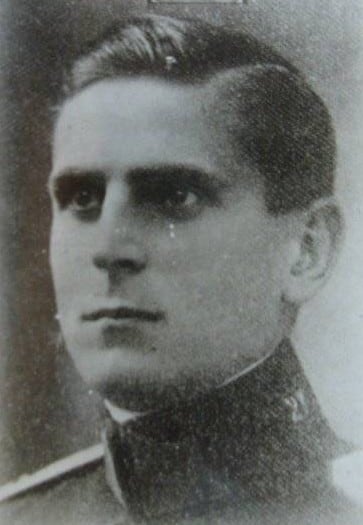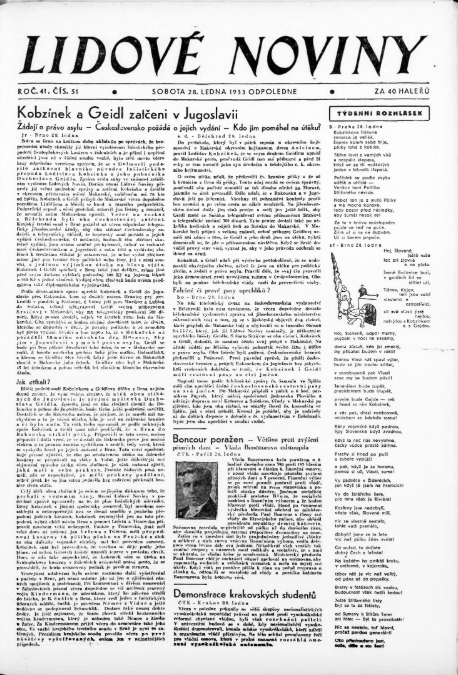Děkuji za pekny článek ✌️
21.01.1933 - The only attempt at a fascist coup in our country ended in fiasco
Categories: Years of war and revolution , Second World War , Calendar
At the same time that Hitler was taking power in Germany, a fascist coup was being prepared in Czechoslovakia.
It is called the Židenice coup because it took place in the Svatopluk barracks, located in the Brno district of Židenice, on the night of 21-22 January 1933. In the end, however, it was not the end, but far from being the beginning of Czech fascism. Ladislav Kobsinek, who was dismissed from the army because of his fascist views.
The Zidenice coup was not his first attempt at a coup. According to military historian Ivo Pejčoch, he did not get enough men on his side because he was mentally unbalanced and for some time he was even in a hospital. "At that time he was in the milieu of members of the National Fascist Community, a far-right political party led by retired general Radola Gajda," the historian notes.
As early as 1922, he became a direct member of the National Fascist Commune (NOF) and ranked among its active functionaries. Eventually he managed to recruit several dozen men confused by fascist ideology. However, they were only informed of the true purpose of the action at the last moment.
Kobsinek chose the date of the coup in the barracks very carefully. The older soldiers had just left for the reserves and the remaining soldiers were on leave. The aim was to collect as many firearms as possible, to get men in uniform on their side, and to set off for Prague the next day. The Nazi henchmen who planned the coup were equipped only with knives, bayonets and a few revolvers.
They attacked from three directions, succeeded in seizing the guardhouse and detaining the officer in charge. But he escaped and organised resistance. The rebels managed to take only a few weapons and some ammunition. A shootout broke out, and the Brno military headquarters soon learned of the incident and together with the officers went to help. "During the two-hour incident, the admirable courage and bravery of the local soldiers was evident. The action resulted in one dead and three seriously wounded," says the 43rd Infantry Regiment Brno Military History Club.
Kobsinek escaped across the border before it became clear that the putsch was actually suppressed in the barracks in Židenice. He fled together with Duchoslav Geidl, who was a relative of the fascist leader Radola Gajda, via Vienna to Yugoslavia. During interrogation, Kobsinek and Geidl stated that they had not committed an ordinary crime but were on the run for a political crime and claimed the right of asylum. They further said that they carried out their act as a demonstration for the present regime of Czechoslovakia. Both of them were taken into preventive detention on the instructions of the Belgrade government," said an article published in Lidové noviny on January 28, 1933.
The local government extradited them both, and Kobsinek was given twelve years in prison. He rejoined the Nazi occupation in 1939.


Source: Lidové noviny, www.vhu.cz, Václav Junek: The Fate of Czech Traitors, Tomáš Pasák: On the History of Czech Fascism
The article is included in categories:
- Archive of articles > Years of war and revolution
- Archive of articles > Wars > Second World War
- Archive of articles > Calendar
Post
Díky za zajímavý článek. 
Díky za připomenutí.
Je dobré taky dodat, že při dalším vyšetřování se účast na plánování tohoto incidentu generálu Gajdovi neprokázala a samotný Gajda se od něj distancoval. Účastníci útoku pocházeli především z okolí Bučovic (Nesovice, Brankovice), kde měla NOF silnou základnu a měla zastupitele v několik obecních zastupitelstvech. Smysl celé akce postrádal logiku puče, nebyla provázanost s armádou a policií, nebyly promyšlen další postup. V období Protektorátu se gen. Gajda zapojil do podpory odboje a do pomoci pozůstalím po zavražděných odbojářích. Více v knize Vítěz který prohrál od Antonína Klimka.
Pěkný článek, díky!
Kuldare: Díky za doplnění, občas si mnozí neuvědomují, že původní příběh je třeba doplnit pokračováním, které může mnohé účastníky podobných akcí očistit.
Gajda je pro mě srdcová záležitost.Byl to náš velikán na,kterého se zapomíná.Jen dodám.Nebyli to nacističtí přívrženci.Stejně jako dříve nebyla Vlajka kolaborantská.To,že byli fašisti v té době moderní politika.Neznamená,že byli i nacisti.Několik z nich pak přešli na stranu kolaborantskou.Vlajka se stala kolaborantskou organizací.Jenže spoustu původních členů už odešlo.
Souhlasím......









